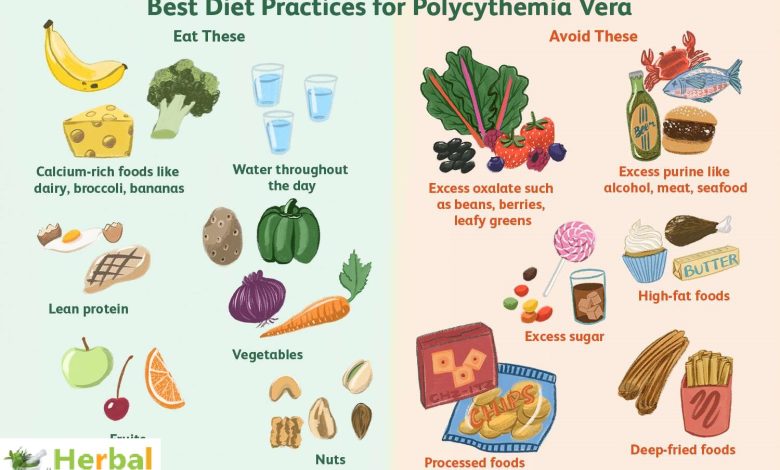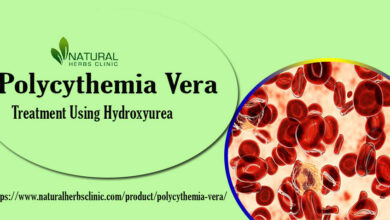Polycythemia Vera Treatment Diet Revealed: Unlock The Power Of Food

Polycythemia Vera (PV) is a rare blood disorder characterized by an increased number of red blood cells, which can lead to various complications if not managed properly. While medical treatments are essential, diet also plays a crucial role in managing PV. The ideal Polycythemia Vera treatment diet, unlocking the power of food to complement traditional Herbal Treatment For Polycythemia Vera and improve your quality of life.
Polycythemia Vera
Before diving into dietary recommendations, it’s essential to understand Polycythemia Vera. PV causes the bone marrow to produce too many red blood cells, leading to thicker blood, which can increase the risk of blood clots, heart attacks, and strokes. Common symptoms include headaches, dizziness, fatigue, and an enlarged spleen. Managing PV often involves phlebotomy, medications, and lifestyle changes, including a tailored diet.
Polycythemia Vera Treatment Diet
Polycythemia vera (PV) is a rare blood disorder where the bone marrow produces an excessive number of red blood cells, leading to thicker blood and potential complications such as blood clots and cardiovascular problems. While medical treatment plays a primary role in managing PV, a well-planned diet can significantly support overall health and complement the treatment. Dietary strategies that can help manage symptoms, improve blood flow, and enhance overall well-being for individuals with polycythemia vera.
Related Article; Exploring Polycythemia Vera Alternative Treatments: Natural Approaches to Managing Symptoms
The Role of Diet in Managing Polycythemia Vera
Dietary choices impact blood viscosity, inflammation, and cardiovascular health, all of which are crucial for managing PV. A treatment-focused diet aims to:
- Improve circulation by preventing blood clots.
- Reduce inflammation.
- Maintain healthy body weight.
- Support general cardiovascular health.
A well-balanced diet can help manage PV symptoms and reduce the risk of complications. Here are key dietary strategies for a Polycythemia Vera treatment diet:
1. Stay Hydrated
Hydration is crucial for people with PV. Drinking plenty of water helps keep the blood thin and reduces the risk of clotting. Aim for at least 8-10 glasses of water per day.
Related Article; Polycythemia Vera Management Often Does Not Follow Guidelines
2. Focus on Anti-inflammatory Foods
Inflammation can exacerbate PV symptoms. Incorporate anti-inflammatory foods such as leafy greens, berries, nuts, fatty fish like salmon, and olive oil into your diet. These foods help reduce inflammation and improve overall health.
3. Limit Iron Intake
Since PV leads to an overproduction of red blood cells, it’s important to monitor your iron intake. Avoid iron-rich foods such as red meat, liver, and iron-fortified cereals. Opt for lean proteins like chicken, turkey, and plant-based proteins.
Related Article; Painful Burning or Numbness of the Hands and Feet: How to Relief
4. Incorporate Antioxidant-rich Foods
Antioxidants help protect your cells from damage and support overall health. Include foods high in antioxidants such as blueberries, strawberries, dark chocolate, and pecans in your diet.
5. Maintain a Healthy Weight
Being overweight can increase the risk of complications in PV patients. Focus on a balanced diet rich in fruits, vegetables, whole grains, and lean proteins. Avoid excessive consumption of sugary snacks and processed foods.
Related Article; Navigating the Use of Hydroxyurea for Polycythemia Vera Recovery
6. Reduce Sodium Intake
High sodium levels can lead to increased blood pressure, which is risky for PV patients. Limit your intake of processed foods, canned soups, and salty snacks. Instead, use herbs and spices to flavor your meals.
Sample Meal Plan for Polycythemia Vera Patients
Here’s a simple meal plan to help you get started on your Polycythemia Vera treatment diet:
Related Article; Polycythemia Vera Diet and Lifestyle Tips: Managing Your Health
Breakfast:
- Greek yogurt with fresh berries and a sprinkle of chia seeds
- Green tea
Lunch:
- Grilled chicken salad with mixed greens, cherry tomatoes, cucumbers, and olive oil vinaigrette
- A side of quinoa
Snack:
- A handful of almonds and a piece of fruit (e.g., an apple)
Dinner:
- Baked salmon with a side of steamed broccoli and sweet potato
- Herbal tea
Related Article; Understanding Polycythemia Vera End Stage Symptoms
Dessert:
- A small piece of dark chocolate
Additional Remedies for Polycythemia Vera
Alongside dietary changes, consider these additional Natural Remedies For Polycythemia Vera:
1. Regular Exercise
Exercise helps improve blood circulation and overall health. Aim for at least 30 minutes of moderate exercise, like walking or swimming, most days of the week.
Related Article; How Can I Reverse Polycythemia Vera Naturally and Effectively
2. Stress Management
Stress can negatively impact PV symptoms. Practice stress-reducing techniques such as meditation, deep breathing exercises, and yoga.
3. Regular Medical Check-ups
Keep up with regular check-ups and blood tests to monitor your condition and adjust your treatment plan as needed.
Foods to Avoid in a Polycythemia Vera Diet
- High-Sugar Foods: Excessive sugar can lead to inflammation and weight gain.
- Processed Meats: These often contain high levels of sodium and unhealthy fats.
- Caffeinated Beverages: Limit intake as caffeine can dehydrate the body.
Conclusion
A well-planned Polycythemia Vera treatment diet can significantly enhance the management of PV, complementing traditional treatments and improving your overall health. Focus on hydration, anti-inflammatory foods, and maintaining a healthy weight, while limiting iron and sodium intake. By making these dietary adjustments and incorporating additional remedies for Polycythemia Vera, you can better manage your symptoms and reduce the risk of complications. Unlock the power of food and take control of your health today!
Related Article; Say Goodbye to Polycythemia Vera with Best Home Remedies




